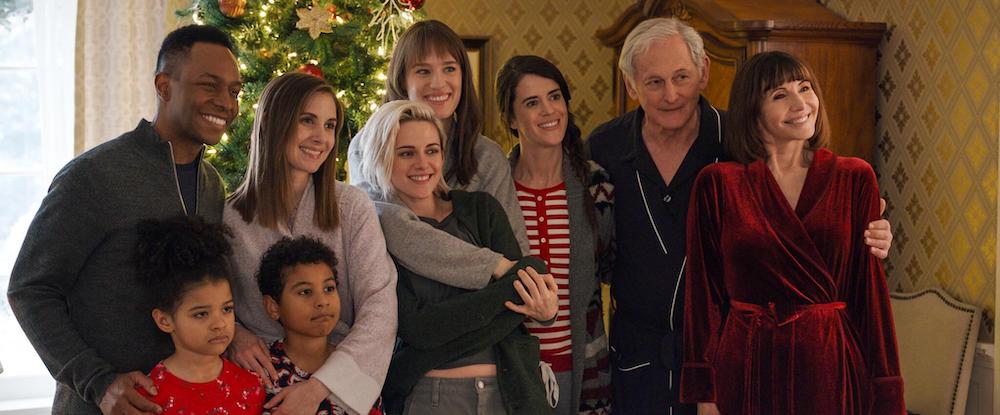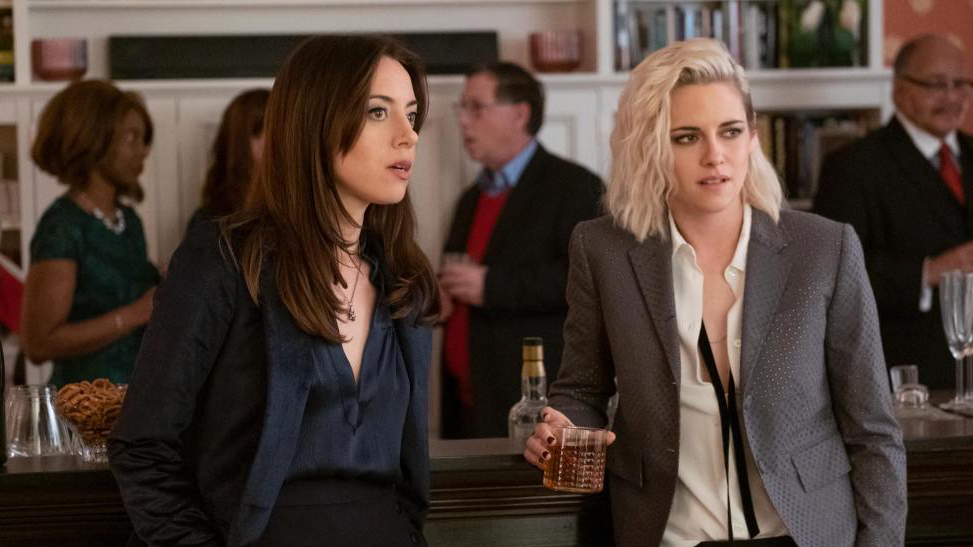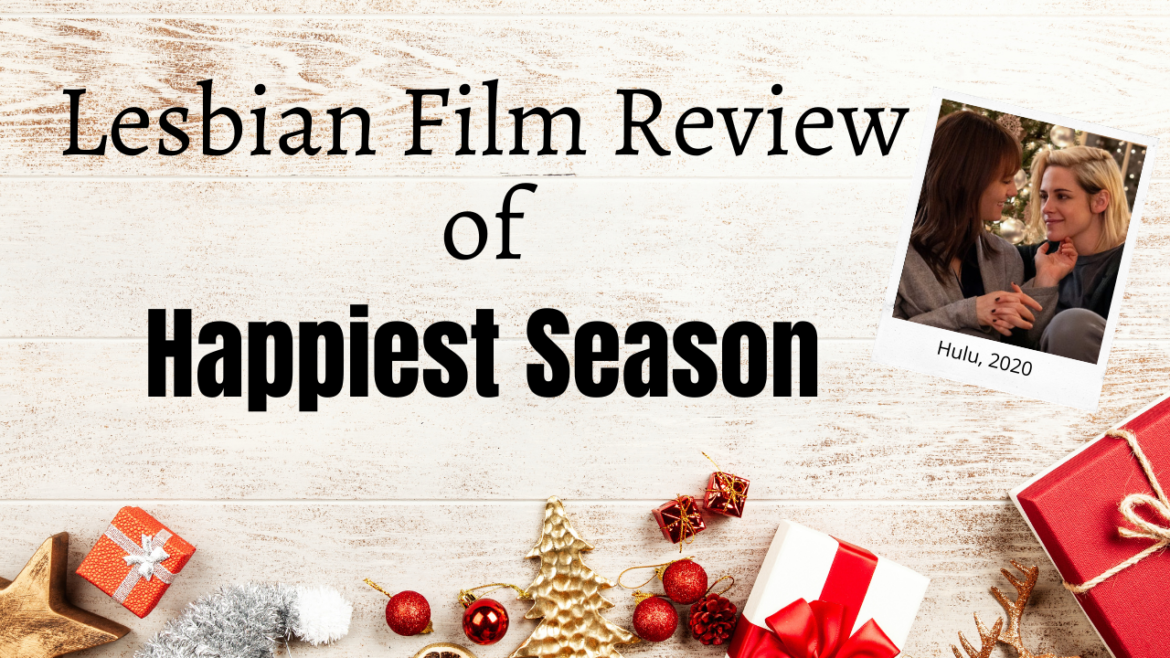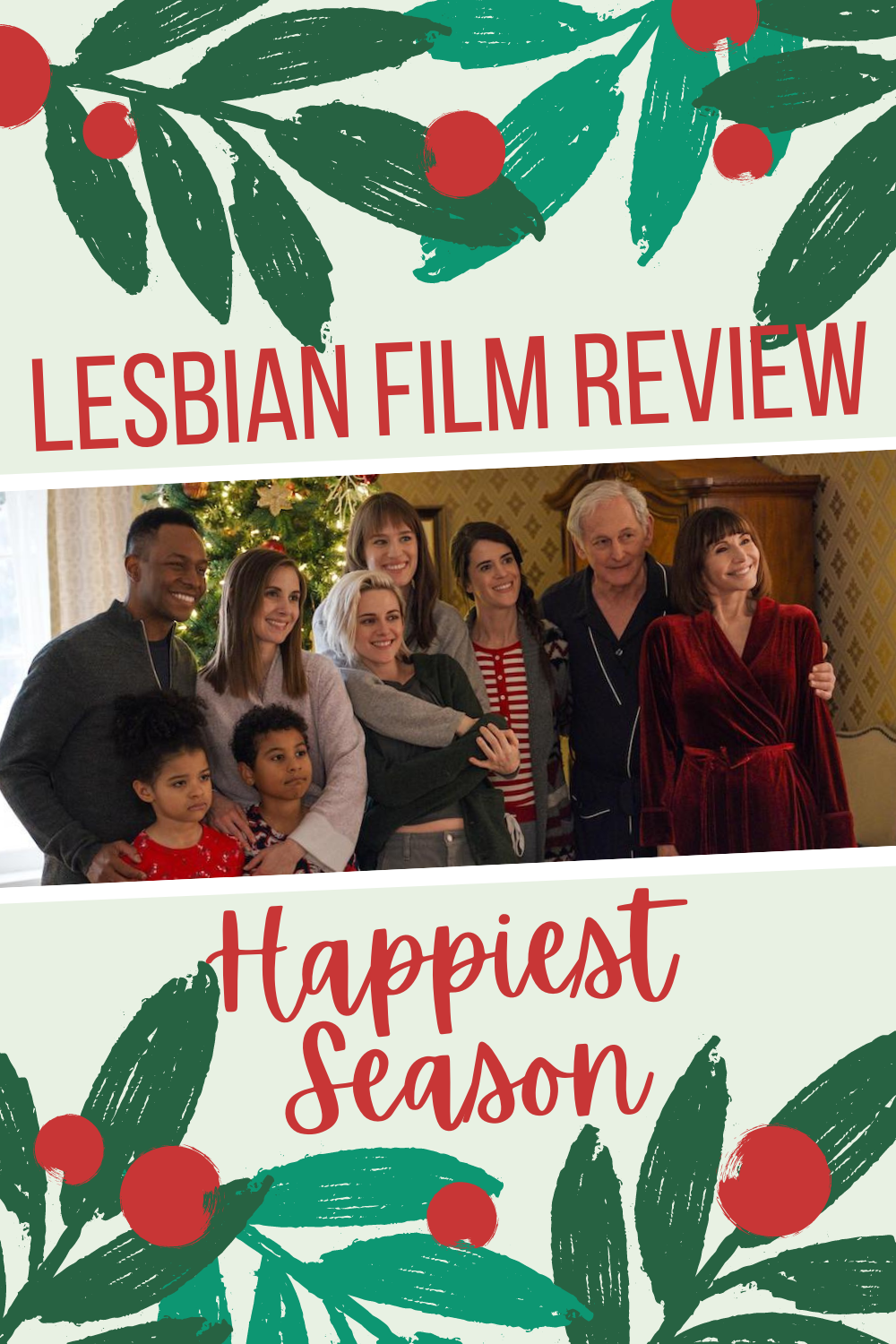Much like all the other queers we know, we were very excited when we first heard about the film Happiest Season. A fun lesbian holiday rom-com? Yes please! A star-studded cast featuring queer women as lead characters is a big deal, and something the lesbian community desperately deserves. It’s really the first time we’ve seen a big budget lesbian film in this genre from a major streaming giant like Hulu, AND it was written and directed by a queer woman. It really ticked all the boxes for us when we first started seeing teasers. Faves like Kristen Stewart, Daniel Levy, and Aubrey Plaza, what could go wrong!?
While it absolutely is a positive sign that this movie got made, the film really disappointed a lot of people (including us). A lot of the LGBTQ+ community appreciated the queer representation but had a lot of issues with how it was presented. It’s definitely marketed as a light-hearted romantic comedy with happy, feel good vibes and gay characters. But in reality, the premise is an emotional coming out story about going back in the closet, and the plot is stuffed full of drama and lies. Yes it’s amazing to have some mainstream lesbian representation on screen, but is it enough to overlook the film’s many faults? And if the queer representation is not positive representation, what about all the non-queer people who will watch this movie? They might take it at face value without learning anything about the nuance of the queer experience or about why positive LGBTQ+ representation matters in the first place. In fact, the reason why we decided to write this review is because of a family friend who reached out to ask our opinion of the film as queer women. As a straight, middle-aged, cis white man who really enjoyed Happiest Season, he wanted to make sure he wasn’t seeing it through a “hetero lens” (his words not ours, cool right!?). And so here we offer you a very lesbian review of Hulu’s Happiest Season.

Happiest Season (2020)
Burl Moseley, Alison Brie, Kristen Stewart, Mackenzie Davis, Mary Holland, Victor Garber and Mary Steenburgen
Credit: Hulu
Warning! The rest of this review includes spoilers for the film!
Happiest Season follows lesbian couple Abby (Kristen Stewart), and Harper (Mackenzie Davis) and their holiday shenanigans. The film opens with arguably the only sweet scene between the two of them, giving us just a small taste of their relationship. Harper invites Abby home to meet her family for the holidays, and we learn that Abby plans to propose to her on Christmas Day. The early scenes of the couple really aren’t quite enough to show us the foundation of their relationship, and even the opening credits of the film feel like an afterthought meant to establish that foundation. Almost immediately the two are headed home for the holidays and Harper drops a major bomb on Abby. She tells her she lied about coming out to her family a year ago, and they don’t know she’s gay or in a relationship. In our first glimpse at what will become Harper’s ongoing toxic behaviour, she asks Abby to closet herself and be her “straight roommate” for the holiday season. (Any queer person knows how cringy this is and many can even relate!). Of course they are already on their way to Harper’s family home, giving Abby no way out of the impending uncomfortable situation.
What follows is even more disappointing. Harper constantly fails to defend Abby while her family is horrible to her, and spends all of her time trying to impress her dad, old friends and even an ex-boyfriend. She begs for her family’s approval at every turn, while being incredibly inconsiderate toward her partner. She doesn’t spend any time with Abby and takes out all of her stress and frustrations on her. She abandons her at family functions and allows her to be uninvited from a holiday event. She introduces Abby as her roommate at every opportunity, and doesn’t let on to anyone (not even her flirty ex-boyfriend) that she’s in a serious long-term relationship. It’s truly uncomfortable to watch as their relationship slowly falls apart before your eyes. We also meet Riley (Aubrey Plaza) who was Harper’s ex from high school, and learn that Harper outed her in a horribly traumatic way when they were teens. Harper quickly becomes so unlikeable that you can’t help but root for her and Abby to break up! Not exactly a great premise for a light-hearted rom-com.
Us queers know a plot like this one all too well. Painful coming out stories seem to be the bread and butter of LGBTQ+ representation in film, but don’t we deserve better by now? It’s not that a story like this one is unrealistic. In fact, it’s very realistic and that’s exactly why it’s painful to watch. A lot of queer people have had traumatic coming out experiences or have been forced back into the closet. Steph could relate immediately to Abby’s character having to pretend to be her girlfriend’s roommate, and was forced to reflect on one of her early relationships with a woman when she was asked to do the exact same thing. There’s nothing sweet or romantic about any of it. Abby is constantly being emotionally manipulated and gaslit by her partner, and she’s just expected to accept the crumbs. Of course coming out is hard, but it’s nearly impossible to have any sympathy for Harper’s character when she’s obviously shown no growth since her high school years. In no way does she prove to be capable of a healthy adult relationship, and she clearly isn’t ready to come out. She doesn’t come out to a single person throughout the film. Not a friend, not her ex-boyfriend, not her sisters, and not her parents. When the family does finally find out about her and Abby (in a particularly uncomfortable scene when her sister publicly outs her), she lies, back peddles, and continues to drag her girlfriend through the mud that is her own internalized homophobia. It’s really tough to watch.
While we’re talking about how awful Harper is, we also need to talk about how awful her family is. They are horrible to Abby before they even know she’s gay. They can hardly welcome her as a friend, let alone as their daughter’s partner. Harper’s sister outing her in front of the entire family is cringy at best and potentially triggering at worst, especially for anyone who has endured that same trauma in real life. Outing someone is never okay, and that scene is quite possibly the most uncomfortable part of the entire film. Isn’t this supposed to be a light-hearted movie!? I don’t see how we’re meant to believe that the family could heal so quickly and easily from all this. They go through some serious shit. And while you may think that Harper’s awful family could explain her abusive behaviour, it simply doesn’t justify it. Yes coming out can be very difficult, especially to a conservative family, but she is truly awful and this is meant to be a comedy!
In our opinion, the biggest issue with the film is how, in honour of its namesake, they try to turn the whole mess into a happy ending. We are to believe that after everything that happens, the family is all of a sudden accepting of Harper being gay and of Abby being her partner. In a flash forward to next Christmas, all is forgiven and the couple is happily engaged and spending time with the family. NOPE! Harper clearly had work to do, and what makes us think she actually did it? She was so incredibly ashamed of her sexuality that she was willing to sabotage her relationship over it and honestly, Abby deserved much better. (We were secretly hoping for a surprise twist that had Abby end up with Riley, because damn, Aubrey Plaza plays a good lesbian). Alas, the ending was all too predictable and entirely underwhelming, and it worries me to think of what it’s teaching young queer people. Abby put up with way too much abuse and we shouldn’t be romanticizing toxic relationships like this on screen. Director Clea Duvall maintains that it was important for the film to have a happy ending because so many LGBTQ+ films are “riddled with bittersweet endings”. Though this ending felt entirely bittersweet because you stop rooting for the couple pretty early on in the story. Harper fails to be a redeemable character and the flash forward conclusion feels forced.

Happiest Season (2020)
Aubrey Plaza, Kristen Stewart
Credit: Hulu
Queer representation in film has come a long way, but we still have a long way to go. It’s 2020 and the LGBTQ+ community wants more. We want to see queer people living lives that don’t revolve around their traumatic coming out experiences! We want to see happy, functional, healthy relationships between queer people, because they do in fact exist! Why couldn’t Abby and Harper have been a lesbian couple heading home for the holidays with a different obstacle to overcome, one that wasn’t about being closeted? Why couldn’t this film have been fun and light-hearted without being weighed down by all of Harper’s internalized homophobia and toxic behaviour? The central storyline sucked all the life out of this movie, and its secondary characters and sense of humour fell completely flat. Which is too bad because it really did have so much potential!
While we’re so glad to see big budget films featuring queer stories, we can’t help but feel like they can do better. We need MORE QUEER FILMS. Of course this movie is easy to criticize because there was so much pressure on it to be the perfect lesbian holiday film, something we’ve never really had before. So many people are longing for the representation that the LGBTQ+ community so desperately needs but doesn’t ever get. Happiest Season is far from perfect but we do at least need to see it as a step in the right direction. A step toward more LGBTQ+ movies being made, more queer people in front of and behind the camera, and more representation for our community.
Have any of you watched Happiest Season? What did you think? Let us know in the comments!


